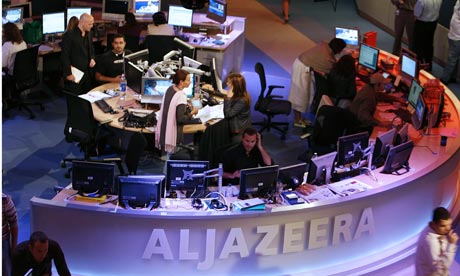- guardian.co.uk,
- Article history

Al-Jazeera's newsroom in Doha, Qatar. The channel has attracted an audience of Arabs disenchanted with state-controlled media. Photograph: Karim Jaafar/AFP/Getty
Few people took much notice in November 1996 when a government-funded TV station began broadcasting six hours a day in Arabic from Qatar, but 15 years later al-Jazeera's fame stretches far beyond the Middle East and its network is a leading player among global media.
The news channel, enjoying an unusual degree of editorial freedom, allowed by the Qatari government, rapidly picked up Arab viewers disenchanted with state-controlled media in their own countries.
It established a reputation for the professionalism of its coverage, and for its studio discussions which raised many previously taboo issues.
Initially many of its staff were recruited from the BBC, which had launched an Arabic TV channel a couple of years earlier but closed it down after censorship attempts by Saudi Arabia, which controlled the relevant satellite.
Al-Jazeera gained extra street credibility when Arab governments shut down its local bureaux or expelled journalists when coverage offended. The Algerian regime was even suspected of arranging power cuts to stop people watching certain programmes.
It was not until 2001 that al-Jazeera began to attract widespread attention in the west. At the time it was the only TV station with a permanent 24-hour satellite link to Kabul during the Afghan war, and its exclusive footage was used by many western channels. It also became famous for broadcasting videotape messages from al-Qaida leaders.
Al-Jazeera's bureau in Kabul was bombed by the US during the Afghan war, as was its bureau in Baghdad during the US-led invasion of Iraq. It was later reported that George Bush had wanted to bomb al-Jazeera's headquarters in Qatar too, but had been discouraged from doing so by the British prime minister, Tony Blair.
The hundreds of millions of dollars poured into al-Jazeera by the emir were undoubtedly a smart investment: they helped put Qatar on the map, politically and diplomatically.
Many say, however, the station is not free to report critically on Qatar or diverge far from Qatari foreign policy. At the same time, though, al-Jazeera's role in promoting free flow of information and opening up political debate in the Middle East is hard to overestimate – its actions probably contributed towards the emergence of the "Arab spring". Following the success of the news channel, a sister-channel, al-Jazeera English, began broadcasting in 2006. A lot of media professionals were sceptical about its prospects, though its coverage of the uprisings in Tunisia and Egypt this year dispelled many of the doubts. At times, channel-hoppers claimed its coverage was beating Sky News and the BBC, not to mention American channels.Despite that, it is still not readily available in the US, allegedly because of fears about its politics.
No comments:
Post a Comment